Bloodgate 10 years on: Tom Williams on rugby's biggest scandal
- Published
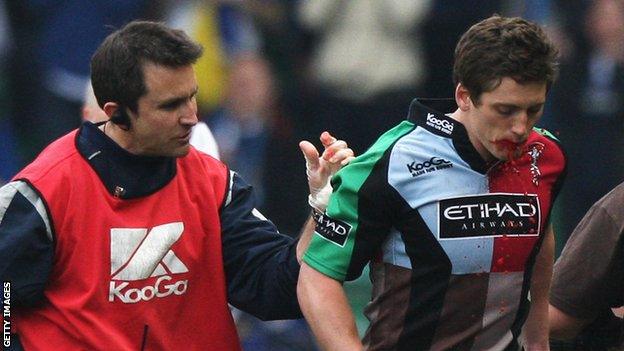
Tom Williams left the field during Harlequins semi-final against Leinster with a 'blood injury'
The date is 12 April 2009. There are five minutes left to play in the Heineken Cup quarter-final between Harlequins and Leinster at Twickenham Stoop.
Dean Richards' Harlequins side trail by a point. Their goal-kicker is off the field with an injury. Their replacement kicker has just pulled his hamstring off the bone. Quins need a penalty or drop-goal to win...
What happens next, involving winger Tom Williams and a fake blood capsule, becomes one of sport's most fascinating scandals.
After four months of protracted disciplinary hearings, Richards resigned and was handed a three-year ban from all rugby.
Steph Brennan, the team physio, was struck off by the Health Professions Council before winning a High Court appeal almost two years after the incident.
Williams was banned for a year, although this was later reduced to four months. Charles Jillings, the club's co-owner, resigned as chairman.
Ten years on, this is the story of 'bloodgate' told by Williams and two team-mates on that day, Danny Care and Ugo Monye.

Williams: I was about to run on to the pitch and the physio said: 'Deano says you're coming off for blood.' That was the first I'd heard of it.
I just ran on the pitch and got on with my job. A few phases later, the physio runs on and gives me a blood capsule and I was like: 'What the hell do I do with this?' He told me to go into contact, put it in my mouth, chew it and go down. 'We'll get you off,' he said.
Care: Genuinely at the time, I had no idea what was going on. I was 22, I'd not experienced anything like it before and I only found out in the changing rooms after when someone said: 'I think we're going to be in a bit of trouble here.'
Monye: Hand on heart, I didn't have a clue what was going on at the time. But I did know blood capsules were a practice at Quins. It was common in rugby back then. You reflect on it now and it was pretty stupid, but it was easy to get away with it.
Williams: Another former player phoned me up recently and said: 'I did it a week before. I didn't put the capsule in my mouth but I just put a towel on my head which was bloodied.'
Why Tom Williams?
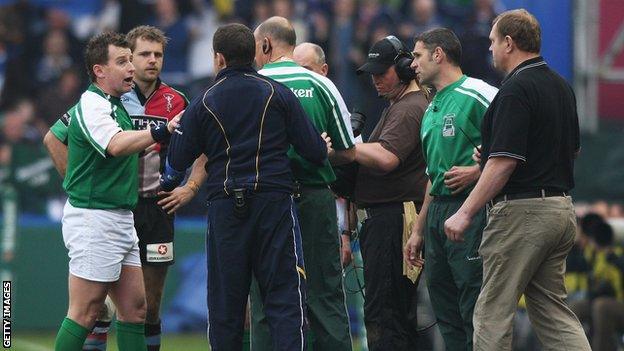
Nick Evans (second from left) replaced Tom Williams but missed a late drop-goal attempt as Harlequins lost 6-5
Monye: It just depended on who you needed to get on to the pitch. You never had conversations in the week and it wasn't a case of 'oh by the way it might be you', it was something that was just done on the hoof.
Fortunately that day, it wasn't me who was asked to do it. If Dean had asked me to do it, because it was so commonplace, I probably would've done it too. It almost became normal because we'd done it a few times and in rugby that's just what was done.
Care: Everyone would have done the same. If you get told to do it, you do it. Especially when it's Dean Richards telling you to do it.
Williams: Nothing crossed my mind when I got handed the capsule, I was doing what I was doing for the team. I was trying to impress my boss and get Quins into a semi-final of Europe.
It was about doing what I could for the team and not having thought in the slightest about the consequences. So what was I most guilty of at the time? Probably following team orders and being a naive 25-year-old who should've known better.
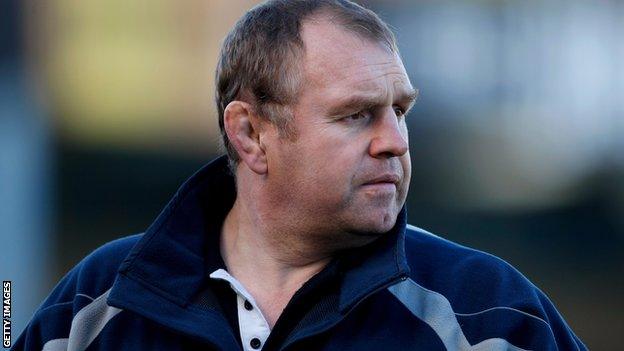
Dean Richards returned to coaching with Newcastle in 2012 - showing contrition over 'Bloodgate' by saying: "I shouldn't have done it."
Why the infamous wink?
Monye: I've never asked you this, Tommy, but why the wink? You look back and you just thought: 'Tommy, come on mate.'
Williams: The wink was ironically quite innocent. It was someone asking me if I was OK and it was me saying: 'Yeah I'm fine.' That was it.
Care: That's why it looks so bad because the wink looks like it was all part of the plot, but it wasn't at all.
What happened in the changing room?
Williams: We knew we had to do something, as people wanted to come in the room to see my mouth. They were banging on the door trying to get into the changing room. Our doctor, Wendy Chapman, and myself, didn't know what to do. It was a really ridiculous time and I realise I looked like an absolute idiot.
Shane Horgan had shouted from the Leinster bench, 'It's not real blood, it's not real blood' as I was stumbling down the tunnel. So we went into the changing room, I had a conversation with the doctor and she made the cut. Logical decision making at the time, for myself and Dr Chapman, was just not there.
What happened in the aftermath?
Williams: I got a sense of how serious it was initially but the club's message to me was along the lines of: 'Don't worry. The maximum it will be is a fine and we'll cover that.'
I went to the first hearing not overly concerned. When I got given the one-year ban, I finally got in touch with the Rugby Players Association, who said: 'Hold on a minute, you're getting hung out to dry here. They're saying you masterminded the whole thing.'
Eventually my wife Alex and I went to meet the board and the chairman one night and we spent three hours going through the possible outcomes.
At about 11pm, I left - as we were going round in circles and they weren't backing me up. But Alex went back into that room and asked every single one of them: 'Who's fault is it that we're here?' I got a phone call the next morning saying: 'Dean Richards is resigning and we wholeheartedly support you.'
Monye: Everyone in the aftermath was thinking about the individual, the team and the club.
Williams: I thought long and hard about taking the fall.
Monye: What changed your mind?
Williams: I said to Alex: 'I don't think I can do this any more, I'm just going to get the hell out.' And she said: 'Well what the hell else are you going to do? You didn't go to university, you've only been a rugby player. How do you want be remembered?'
What did the other players think?
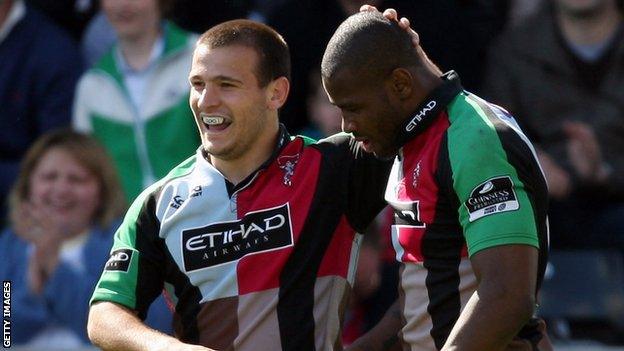
Danny Care and Ugo Monye were team-mates with Harlequins and England
Monye: If we're speaking truthfully, the players were massively divided. There was a part of me that was like: 'Tommy, just take the hit.' He'd have been a hero among us because he'd have fallen on his sword.
We wanted to protect the reputation of the club. Selfishly we were just thinking of how we could protect everyone involved in it but it was an impossible solution and about damage limitation for us.
Care: We didn't know what blame Tommy was getting.
Williams: I knew the issue the players had. It was similar to the internal issue I had myself in terms of the wider picture. A couple of players were saying to me in passing 'loose lips sink ships' but that's just childish bullying essentially. They were very loyal to Dean and just looking after their friend's best interests.
Returning to Quins
Williams: It was a difficult situation because I wanted to play rugby but there was a little something attached to my name which made most clubs not want to employ me. I did look elsewhere but I didn't get very far down the line. My agent just said no-one was interested.
I was pretty ill during that four-month ban and these days it would probably be diagnosed as depression. I lost two stone and I thought: 'What is it that I'm playing rugby for?' I just wanted the opportunity to come back and find some pride in myself, and hopefully give some back to Quins as well.
10 years on...
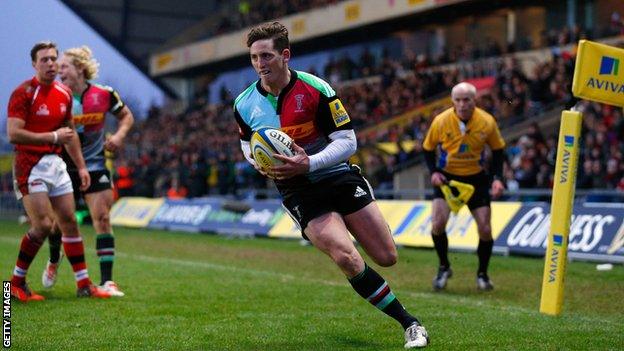
Tom Williams retired as a player in 2015 and joined Harlequins' academy staff as a coach
Williams: That day hasn't been away from my thought process ever since that moment it happened 10 years ago. Inevitably there's a stigma that's still attached to my name now that's no longer attached to Harlequins.
Every time Harlequins are written about in the papers, it doesn't say 'bloodgate', does it? Every time I'm written about in the papers, it says 'bloodgate'. So who's got the stigma?
Yeah, I'll take that it could've been worse. But it doesn't get much worse than people turning up in vampire outfits to Twickenham the next season. It doesn't get much worse than turning up at Sale and people calling you a cheat. How much worse could that get?
Monye: 12 April 2009 was undoubtedly the darkest day in Harlequins history. We lost a lot of great women and men from that and the club's reputation was tarnished, but off the back of that we were able to find the strength to block out all the exterior noise and get back to what we were. No-one will understand how bad it was, though, more than Tommy.
I'm just glad in some ways that we got caught because it cleaned up rugby, and to my knowledge it's not been done since.
Care: It was a massive wake-up call for rugby and definitely for Harlequins. We faced an unbelievable punishment, people lost their jobs and Quins can't ever have anything like that on their name again.
For the club, the best thing was that we got caught but for Tommy, it was the worst.